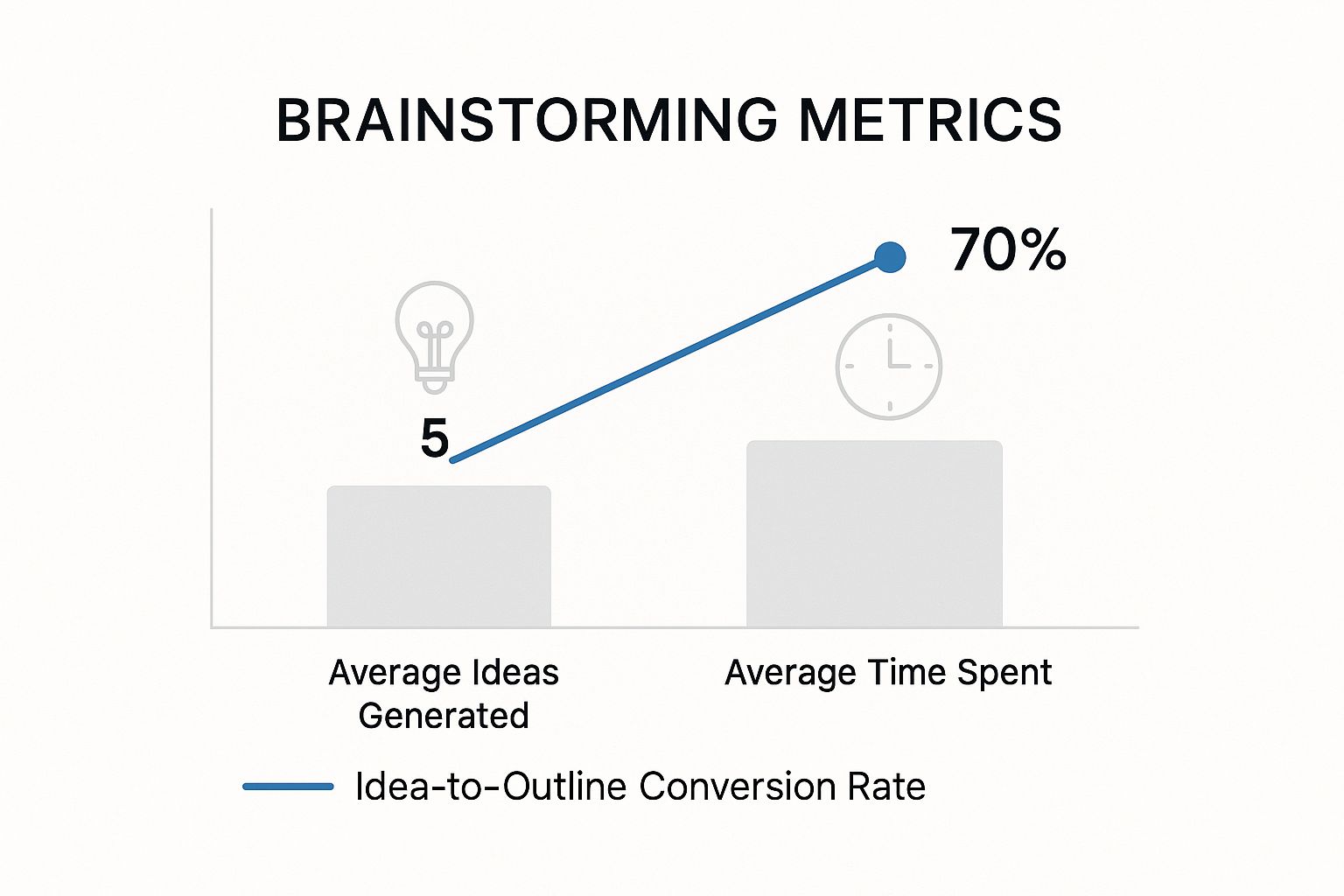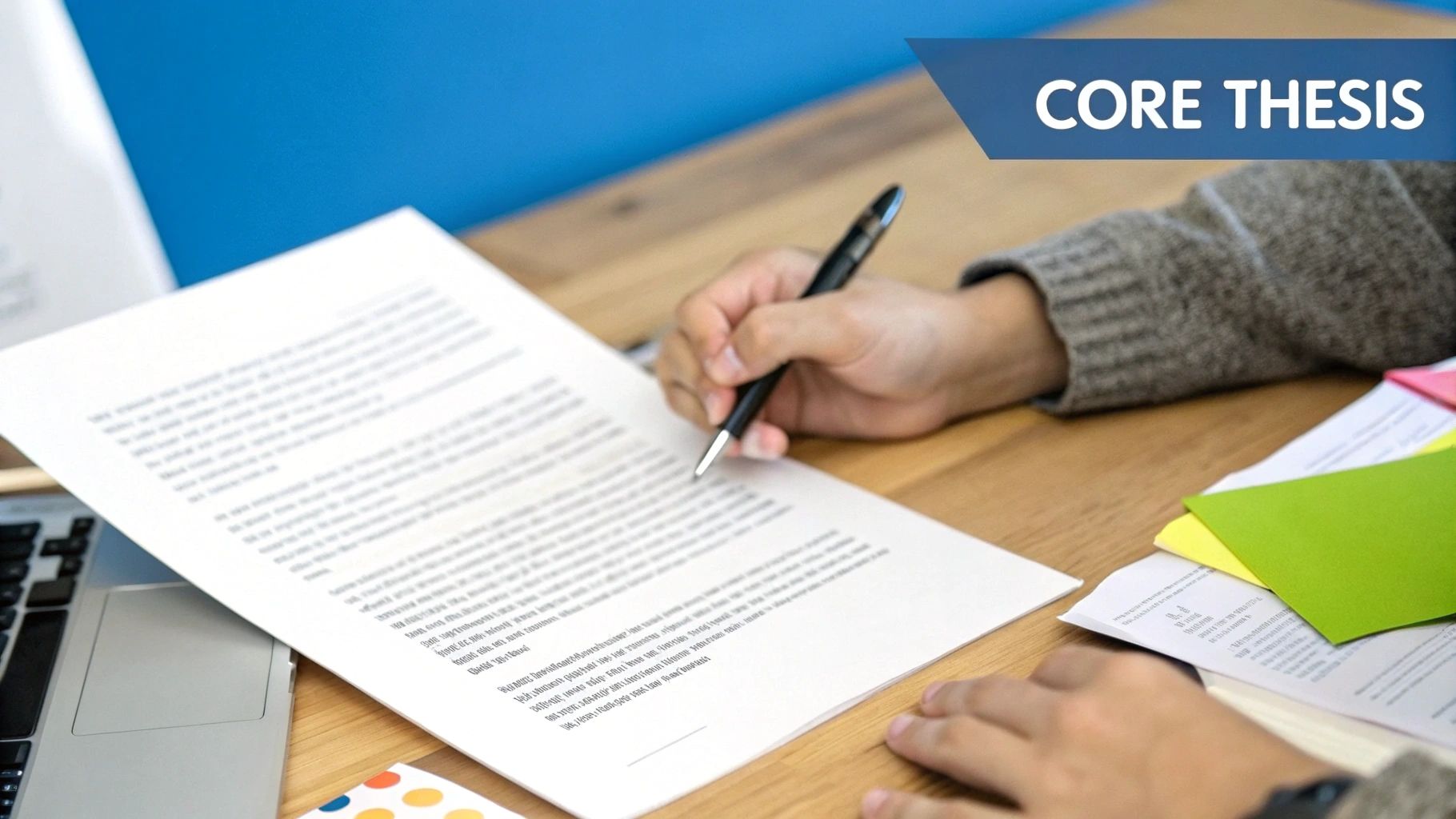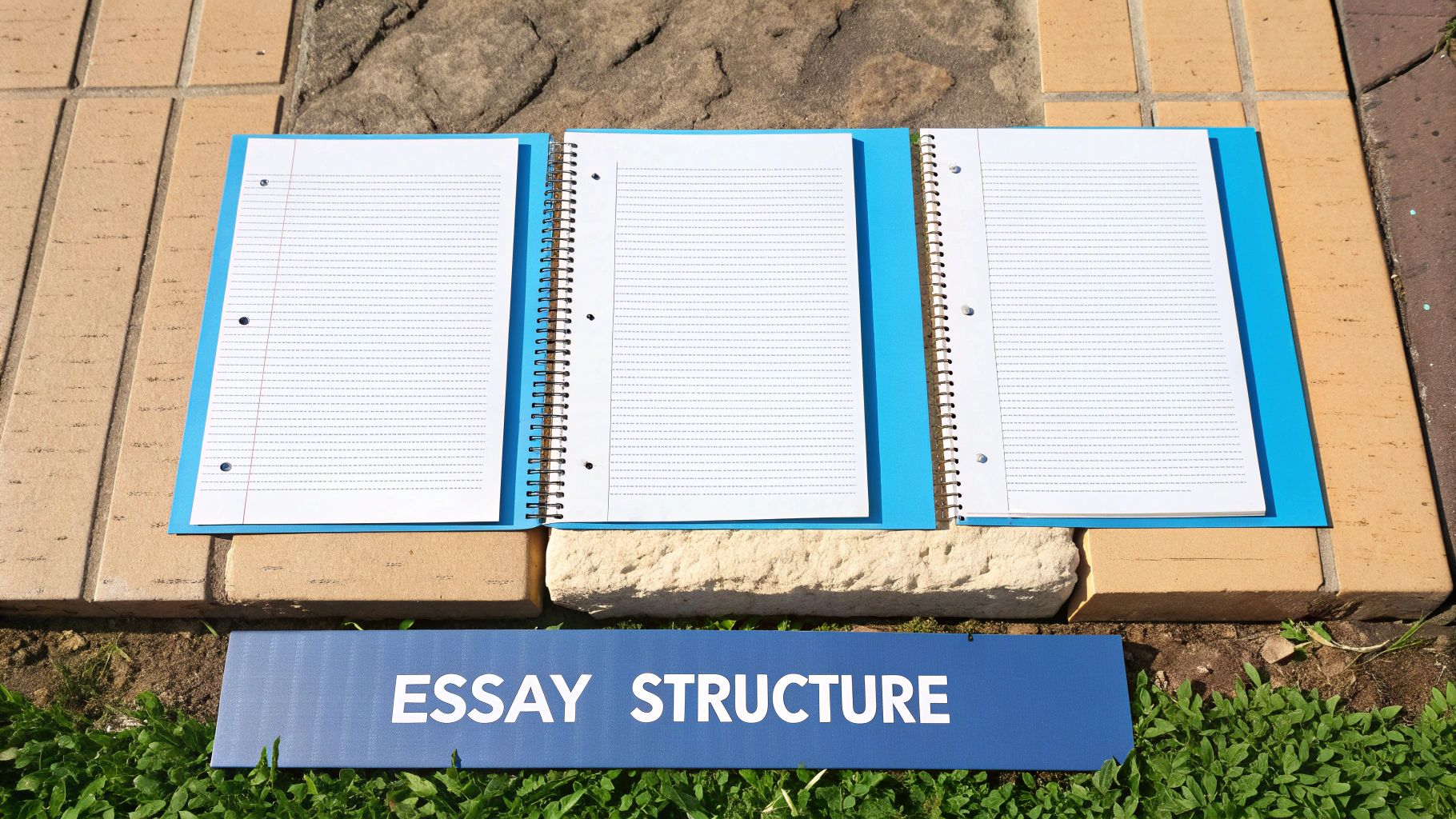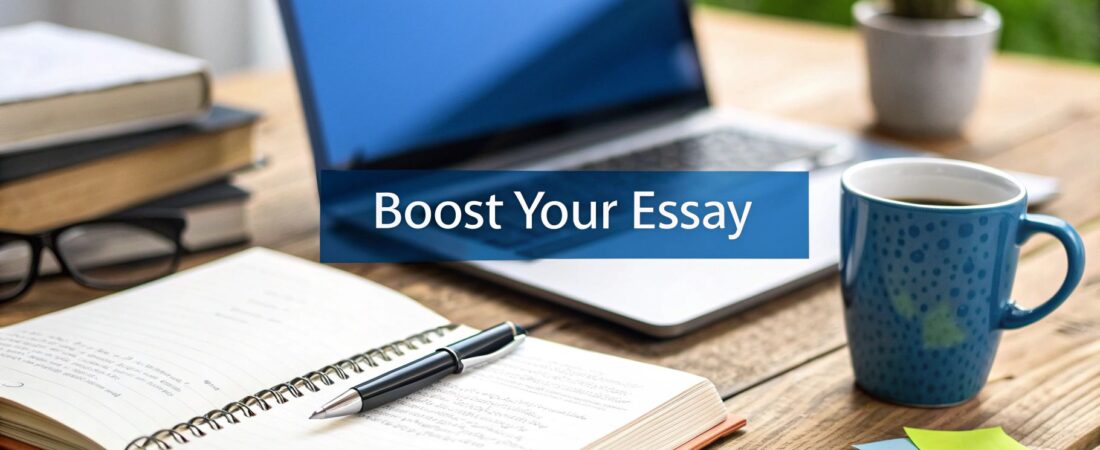Why Most Essay Writing Advice Keeps You Stuck
Let's be real, the five-paragraph essay structure you learned way back when is probably doing you more harm than good. It's like trying to write a symphony with just three chords – technically music, but not exactly inspiring. I’ve spent years working with students and writing coaches, and there’s a consistent problem: old-school essay advice creates boring, predictable writing. It kills creativity and makes the whole experience feel like a chore.

This infographic shows some interesting stats about brainstorming. Look at how just 15 minutes of focused brainstorming generates an average of 5 ideas, and 70% of those actually turn into a solid outline. This really highlights how important that initial brainstorming session is, even if it’s short. Having the right tools can also make a difference. Thinking about your workspace and even things like school supplies can have a positive impact on your writing.
The Problem With Perfectionism
One of the biggest hurdles to better essay writing? The pressure to get it perfect right out of the gate. It’s crippling. I’ve seen so many students get hung up on crafting the “perfect” opening sentence that they never really get started. This perfectionism leads to procrastination and, ultimately, a rushed, subpar essay. And, that fear of making mistakes stops you from experimenting and exploring different ideas, which just creates generic arguments.
This is something I struggled with too. I’d spend hours agonizing over every single word, only to realize later that my first instincts were usually the best. Overcoming this mental block is essential for unlocking your writing potential. It's like learning to ride a bike. You didn't learn by reading a book, you learned by trying, falling, and getting back up. Writing is the same. Embrace the mess. It’s interesting to see how much the essay writing service market has grown – it was valued at about USD 1.97 billion in 2023 and is predicted to hit USD 4.35 billion by 2032. You can read more about this growth here. This really shows how important strong writing skills are in today’s academic and professional world.
Breaking Free From Outdated Methods
The secret to better essays is ditching those old-fashioned approaches and embracing something more dynamic. This means moving away from rigid structures and using more flexible strategies. It’s also about understanding that writing is a process, not a one-and-done kind of thing. By letting go of the need for instant perfection, you open up space for experimentation, critical thinking, and ultimately, much more compelling writing. This sets the stage for the practical tips we'll cover next, which will help you significantly level up your essay game.
Let's take a look at the differences between traditional and modern essay writing approaches:
To help illustrate this shift in mindset, here's a comparison of the old and new ways of approaching essay writing:
Traditional vs. Modern Essay Writing Approaches
| Aspect | Traditional Approach | Modern Approach | Impact on Quality |
|---|---|---|---|
| Brainstorming | Limited, often formulaic | Extensive, exploring diverse perspectives | Improves depth and originality of arguments |
| Structure | Rigid five-paragraph format | Flexible, adaptable to the topic | Enhances flow and engagement |
| Research | Primarily textbooks and encyclopedias | Diverse sources including online databases & journals | Strengthens evidence and supports more nuanced arguments |
| Writing Process | Linear, start to finish | Iterative, with revisions and refinements | Leads to a more polished and well-structured final product |
| Tone | Formal, academic | Conversational, engaging | Increases readability and connection with the reader |
| Use of Tools | Limited to dictionaries and thesauruses | Utilizes grammar checkers, plagiarism detectors, AI paraphrasers | Improves clarity, accuracy, and originality |
This table shows how moving from a rigid, formulaic approach to a more flexible and iterative process can significantly impact the quality of your writing. Modern techniques allow for deeper exploration of ideas, more engaging writing, and a more polished final product. Embracing these modern methods empowers you to create essays that are not only well-structured and well-researched but also captivating and insightful.
Leveraging AI Tools Without Losing Your Voice
Smart writers aren't afraid of AI. They use it strategically. Think of AI as an electric guitar—it doesn’t replace the musician; it gives them new avenues of expression. The real trick is knowing which tools actually deliver and how to use them without sacrificing your own unique perspective. That’s where SmartStudi comes in.

This screenshot shows the SmartStudi homepage. See how they’ve laid out all these AI-powered tools? It’s designed to be easy to use and accessible. Whether you need a quick grammar check, want to run something through an AI detector, or even explore essay generation, it’s all right there. SmartStudi puts the power back in your hands. Want to check out their essay generation tools? Here’s the link: Generate an essay with SmartStudi.
SmartStudi: Your AI-Powered Writing Companion
SmartStudi has a whole suite of tools designed to enhance, not replace, your writing. Their AI detector helps you maintain academic integrity by flagging areas of potential plagiarism (we all know it can happen unintentionally!). And their grammar checker? It's like having a personal proofreader on call 24/7, catching those little errors that always seem to slip through. Honestly, I use these tools all the time to polish my own work. They free you up to focus on the important stuff—your ideas and arguments—while the tools handle the finer details.
Finding Your Authentic Voice With AI
Lots of people worry about AI making their writing sound robotic. But think of these tools as collaborators, not ghostwriters. The paraphrasing tool, for example, isn't about copying; it's about helping you express complex ideas in your own way. I often use it to rephrase tricky research concepts or just to smooth out a clunky sentence. It’s fascinating to see how interest in AI writing tools has exploded. From July 2023 to early 2025, searches for “AI essay writer” jumped by 537%, while searches for traditional essay services dropped by 41%. Check out the search trends here. It shows how students are actively looking for ways to improve their writing process. Used thoughtfully and ethically, these tools can actually strengthen your writing while preserving your individual style.
Crafting Arguments That Change Minds

Let's be honest, nobody wants to write an essay that just blends in. We all want to craft arguments that truly resonate, the kind that stick with your professor long after they've finished grading. These exceptional essays don't just present facts; they build compelling arguments. Think of it like architecture: facts are the bricks, but your argument is the blueprint that makes it all come alive.
Beyond the Formula: Embracing Nuance
Forget rigid formulas. Real arguments are rarely black and white. Embrace the gray areas! Acknowledging complexity makes your essays far more insightful and persuasive. For example, instead of stating the obvious (like "climate change is bad"), dive into the nuances. Sure, mention the scientific consensus, but also explore the economic and social implications of transitioning to green energy. Trust me, this nuanced approach showcases critical thinking, and makes your argument way more convincing.
Think of it this way: you’re not just presenting information, you're engaging in a conversation.
Strategic Evidence: Quality Over Quantity
I've seen so many students fall into the trap of thinking that piling on evidence automatically equals a stronger argument. It's not about the quantity of evidence; it's about the quality and how you weave it into your argument. One perfectly chosen statistic can have a far greater impact than a page full of weak citations. Focus on how your evidence supports your overall thesis. Less is often more.
If you're looking for ways to create more engaging content, even for things like image captions, check out this resource on AI generated captions. Sometimes a little help with creative phrasing can go a long way!
Anticipating Counterarguments: Showing You’ve Thought It Through
Truly persuasive arguments don't just present one side; they anticipate and address opposing viewpoints. It's like a chess match – you need to anticipate your opponent's next move. By acknowledging and respectfully responding to counterarguments, you demonstrate intellectual honesty and significantly bolster your own position. This shows you've really thought things through.
Crafting Smooth Transitions: Guiding Your Reader
Finally, remember the importance of transitions. They're the unsung heroes of a great essay. Smooth transitions guide your reader through your logic, making your writing clear and easy to follow. Use words like “however,” “furthermore,” and “in contrast” strategically to connect your ideas. This creates a cohesive and compelling narrative that keeps the reader hooked. This might seem like a small detail, but trust me, it makes a huge difference in the overall impact of your essay.
Research Techniques That Uncover Hidden Gems
Let's be honest, solid research is the foundation of any essay that's going to impress. But so many students just stick to the basics, completely overlooking a goldmine of information. So, I'm going to share some advanced research techniques that can truly elevate your essay writing game. These are the tricks of the trade that separate the good from the great.
Navigating Academic Databases Like a Pro
Think of academic databases like JSTOR or EBSCOhost as massive libraries, packed with insightful journal articles, research papers, and all sorts of scholarly publications. The key is knowing how to find what you need without getting lost. Start by figuring out the keywords that are most relevant to your essay topic.
Then, use Boolean operators (AND, OR, NOT) to refine your search. For example, let's say you’re writing about how social media affects teenagers' mental health. You could search for "social media" AND "teenagers" AND "mental health." See how that works? It helps you zero in on the most relevant sources quickly. Also, don't forget those advanced search filters! Filtering by publication date, language, and document type can save you tons of time.
The Power of Expert Interviews
Sometimes, the best insights come straight from the horse's mouth. Conducting expert interviews can give your essay serious depth and credibility. Think about who the leading voices are in your field and reach out to them. Email or even a well-crafted message on social media can work wonders. Just remember to prepare some thoughtful questions beforehand and be respectful of their time. These firsthand perspectives can offer unique insights you won’t find anywhere else.
Identifying Credible Sources in the Digital Age
With so much information available online, knowing which sources to trust is more important than ever. Stick to reputable organizations, academic institutions, and recognized experts. Be wary of blogs and websites with anonymous authors or a clear bias. A good habit to develop is cross-referencing information across multiple sources. This helps you double-check accuracy and adds weight to your arguments. It's interesting to see how the essay writing platform market is growing – projected to jump from USD 1.8 billion in 2023 to USD 4.5 billion by 2032. This report offers some great insights into that growth. It really highlights the increasing need for writing support.
Organizing Your Research and Note-Taking
Once you've got your research materials, you need a good system for keeping everything organized. Find what works best for you, whether that's folders, digital note-taking apps like Evernote, or a mix of both. Personally, I like to use a combination. A digital tool helps me quickly capture and organize my notes, but I also like to print out key articles and highlight important sections. Trust me, having a solid system in place makes it so much easier to put everything together and build strong arguments when you actually sit down to write. And don't forget about citations! SmartStudi's Citation Generator can be a lifesaver for keeping your sources organized and cited correctly, especially when you're starting to synthesize everything.
Opening and Closing With Maximum Impact
Your essay's introduction and conclusion are like the pillars of a bridge – they support the entire structure and determine whether it stands strong or crumbles. Forget those tired, generic hooks and summary conclusions. Let's talk about creating openings that grab attention and closings that leave a lasting impression.
Crafting Irresistible Introductions
Think of your introduction as a first date. You want to make a good impression, right? It's about showing your confidence and sparking interest. A strong introduction establishes your credibility and hints at your unique perspective on the topic. I've seen student essays start with a powerful statistic that instantly sets the stage. Others begin with a compelling anecdote that pulls the reader in. There’s no magic formula. The key is choosing the right approach for your audience and your essay's purpose.
I once worked with a student writing about the impact of social media on body image. Instead of starting with a general statement, she opened with a personal story about a friend who struggled with an eating disorder after constantly comparing herself to influencers online. That personal touch instantly made the essay relatable and powerful. That, my friends, is the power of a well-crafted introduction.
Hook Techniques That Work
Let's dive into some effective hook techniques:
- Compelling Statistics: A striking statistic can immediately grab attention and show why your topic matters. Imagine starting an essay on cyberbullying with a statistic about how many teens experience it. Boom! Instant impact.
- Thought-Provoking Scenarios: Painting a picture of a hypothetical situation or a real-world example can really engage the reader’s imagination. Think about opening an essay about artificial intelligence with a scenario where AI replaces human jobs. Intriguing, right?
- Provocative Questions: Asking a question that challenges the norm or makes the reader think critically can be a great way to start. For example, an essay on education reform could begin with a question about the true purpose of education.
The best hook? The one that feels most natural for your topic and your voice. Experiment and see what works for you.
To illustrate, let's look at a few hook techniques and how they impact reader engagement:
Let's break down a few examples of effective hook techniques:
| Hook Type | Best Used For | Reader Engagement Level | Example Context |
|---|---|---|---|
| Compelling Statistic | Highlighting the importance of a topic | High | "Over 50% of teenagers report experiencing cyberbullying." (Essay on cyberbullying) |
| Thought-Provoking Scenario | Engaging the reader's imagination | Medium-High | "Imagine a world where robots perform all surgeries." (Essay on AI in medicine) |
| Provocative Question | Encouraging critical thinking | Medium | "What if schools focused on creativity instead of standardized tests?" (Essay on education reform) |
This table shows how different hooks can be tailored to specific topics and desired levels of engagement. A statistic offers immediate impact, while a scenario or question invites deeper reflection.
Conclusions That Resonate
Your conclusion isn’t just a summary; it's your mic drop moment. Instead of simply restating your points, try to synthesize your arguments in a way that offers new insights. It should be like the final chord of a song—memorable and impactful.
One technique is to offer a call to action. Encourage your reader to think differently or even take concrete steps related to your argument. Another approach is to connect your argument to a broader context, showing its wider significance. This demonstrates that you've thought beyond the immediate scope of the essay. These strategies elevate your writing, creating a complete and satisfying reading experience. They show you've truly mastered the subject.
Revision Strategies That Transform Rough Drafts

This screenshot shows SmartStudi's grammar checker. See how clean the layout is and all the options you have? From grammar and spelling to even checking your tone, it’s all right there. Trust me, having easy access to features like these makes a huge difference in making your essays clear and accurate. Think of all the time – and potential embarrassment – it can save you!
Let's be honest, the difference between a decent essay and one that truly wows often comes down to revision. But so many students think editing is just a quick spell-check. It’s so much more than that! It's like baking a cake – you wouldn't just leave it unfrosted, would you? Revision is where you add that extra something special, the polish that makes your essay truly shine. So, let's talk about some revision strategies that can take your writing to the next level.
Reading Your Work Objectively: The Outsider’s Perspective
Okay, so one of the trickiest parts of revising is looking at your own work with fresh eyes. After spending hours on a piece, it's hard to see where it falls short. One thing I like to do is print my essay and read it aloud. It’s amazing how many awkward phrases and clunky sentences you catch that way. Another trick? Reading your essay backward, sentence by sentence. Sounds weird, I know, but it forces you to focus on the mechanics of each sentence – grammar, punctuation, word choice – instead of getting caught up in the flow.
Identifying and Addressing Common Writing Issues
We all have our writing quirks. Maybe you overuse adverbs, or your sentences always start the same way. Figuring out your specific weaknesses is key. Once you know your tendencies, you can actively look for them when you revise. For example, I used to rely way too much on passive voice. Now, I specifically hunt down those passive constructions and rewrite them to make my writing more direct and engaging.
SmartStudi Tools: Your Revision Allies
Here’s where tools like the SmartStudi grammar checker and paraphraser come in. Think of them as your personal editing dream team. The grammar checker catches those little typos and grammar slips that can make your writing look less polished. The paraphraser is great for refining your phrasing and making sure your ideas are crystal clear. I personally find the paraphrasing tool super helpful for reworking sections that feel a little too wordy or confusing. These tools free you up to focus on the big picture – the structure, the arguments, the overall impact of your essay.
The Psychology of Effective Revision: Letting Go and Embracing Change
Revision isn't just about fixing mistakes; it’s about being willing to make big changes. That means being ready to cut entire paragraphs, move sections around, or even rewrite whole chunks of your essay. I know, it can be painful to delete something you've worked hard on, but sometimes it’s the only way to create a truly polished and effective piece. Think of it like sculpting – you chip away at the extra bits to reveal the masterpiece underneath. Letting go of your attachment to your initial draft is essential for taking a good essay and making it truly great.
Your Personal Roadmap to Writing Excellence
So, we've covered some powerful techniques. Now, let's talk about actually using them. Theory is great, but consistently putting these ideas into practice? That's where the real improvement happens. We're going to build a personalized system for leveling up your essay writing.
Identifying Your Strengths and Weaknesses
First, a little self-reflection. What are you already killing it at? Are you a brainstorming beast, overflowing with ideas? Or maybe you're naturally gifted at constructing rock-solid arguments. Knowing your strengths is like finding a solid foundation to build on. Equally important is recognizing your weaknesses. Do you get bogged down in research? Does revising feel like torture? Once you pinpoint these areas, you can create a targeted plan for improvement. It's like a coach developing a training regimen – they focus on maximizing existing talents while addressing areas that need work.
Creating a Personalized Action Plan
Next, let’s map out your route. This isn’t a one-size-fits-all deal. Your plan has to be tailored to your specific needs and goals. Want to write essays faster? Your plan might involve timed writing drills and strategies for making research more efficient. Trying to write more nuanced, sophisticated arguments? Focus on techniques for anticipating counterarguments and weaving in different perspectives. This personalized approach is what makes the whole process really click.
Practical Templates and Checklists
Let's get down to brass tacks. I'm a huge believer in templates and checklists. They keep you organized and ensure you don’t skip any crucial steps. A brainstorming template, for example, can guide you through various idea-generation techniques. A revision checklist might remind you to double-check for common errors, beef up your arguments, and refine your writing style. These tools provide a structured framework for your entire writing process, from initial brainstorming all the way to submitting the final draft. Over the years, they’ve seriously changed my writing game.
Managing Your Time Effectively
Time management is a major hurdle in essay writing, especially when you're juggling multiple assignments. A realistic schedule is your best friend here. Break those massive tasks into smaller, bite-sized pieces. Instead of attempting to write a whole essay in one go, allocate specific time slots for brainstorming, research, writing, and revision. This breaks down the mental barrier and helps you maintain momentum.
Tracking Your Progress and Making Adjustments
Remember, improvement is a marathon, not a sprint. Track your progress and acknowledge your accomplishments! Not seeing the results you’re after? Don’t hesitate to switch things up. Maybe you need to adjust your writing schedule, experiment with different revision techniques, or explore tools like the SmartStudi suite. The key is to stay adaptable and keep experimenting until you find what works best for you. This personalized approach is the most effective way to make real, lasting improvements in your essay writing.
